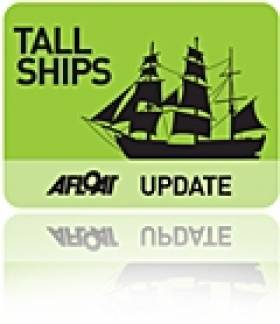Displaying items by tag: finance
IWDG Secures 75% Funding for Celtic Mist Refit
#TALL SHIPS - The Irish Whale and Dolphin Group (IWDG) has secured three-quarters of the funding it required to refit its research vessel Celtic Mist.
According to The Irish Times, the Clare Local Development Company has approved the allocation of a €48,000 grant towards the refurbishment of the ketch.
The work will be carried out by Cathal Blunnie and several sub-contractors, and involves stripping down the main cabin and removing the bath and shower to increase space for crew berths.
While the ship's clock will be retained, the ship’s wheel in the main cabin will be removed and presented to the Haughey family as a gesture of appreciation.
As previously reported on Afloat.ie, the 52-foot yacht - which was gifted by the Haughey family to the IWDG to assist in its marine wildlife conservation work - entered dry dock last November in preparation for the refit work, after relocating to its new berth at Kilrush, Co Clare in July.
This followed its last jaunt at sea in its former guise, completing a leg of the Tall Ships Races from Waterford to Greenock in Scotland.
The cost of refurbishing the yacht for research and training purposes is expected to top €60,000, with an annual running cost of some €20,000, for which the IWDG is seeking ongoing financial assistance.
The group aims to get the Celtic Mist back at sea before the summer.
Life Made Plain Sailing For Yacht Crew
Douglas, ISLE OF MAN - Moore Stephens Isle of Man, leading providers of multi-sector wealth management services has today announced a comprehensive financial support service for Superyacht crew through one of its group companies, Moore Stephens Crew Benefits Limited.
Speaking about the service line, Clive Dixon, managing director said, "While this was the logical next step in the development of the product, we actually ended up with a brand new offering powered by the International FlexiPlan retirement savings scheme. We listened to our clients who asked us to refine our existing product and the end result is a highly flexible client-focused way of managing crew benefits. Our clients wanted to be empowered to make investment decisions on the level of retirement savings they have, which is where the International FlexiPlan works perfectly."
The comprehensive service which will incorporate a 24/7 helpline comes on the back of Moore Stephens' successful Superyacht registration, HR solutions and yacht owner services which had already expanded into yacht crew payroll. It includes:
· Retirement savings plans, flexible and adaptable to a crew member's unique lifestyle, available in all major currencies.
· Health insurance, including hazardous sport, piracy and kidnapping options, but always with Med-evac as standard.
· Accident cover for dismemberment, permanent incapacity and death, among other options.
· Flexible income protection and life insurance.
"Our clients can either leave their retirement savings to be managed by their chosen provider or manage their own retirement savings using the investment funds available in the International FlexiPlan through a secure web-based platform. The International FlexiPlan has been specifically tailored with seafarers in mind. No other product on the market has been dovetailed to their needs in such a way. Our goal is to become a one-stop financial shop for crew, it's as simple as that," continued Clive.
All crew become members of "Moore Stephens Crew Club" www.mscb.im with a dedicated website and membership card which includes the telephone number of their personal 24/7 helpline.
While the International FlexiPlan retirement savings scheme was designed by Moore Stephens Isle of Man to minimise fees and charges, including fund investment fees, so that the saver gets a low cost solution to their retirement savings need, other services such as banking and insurance were arranged through strategic alliances with international banks and specialist providers with an international perspective.
Bransom Bean, Director of Moore Stephens Crew Benefits Limited, who project managed the offering, said, "We sourced specialist underwriters to provide a truly comprehensive global coverage scheme including global air Med-evac, piracy and ransom and coverage in the USA." He explained the rationale by stating, "Our brief was to design an ultra low-cost, fully flexible, international insurance product with the unique lifestyle of a yacht crew member in mind. This is a perfect fit for us as well - what could be more international than Superyachts?"

























































